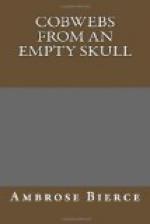* * * * *
THE SETTING SACHEM.
’Twas an Injin chieftain, in feathers
all fine,
Who stood on the ocean’s
rim;
There were numberless leagues of excellent
brine—
But there wasn’t enough
for him.
So he knuckled a thumb in his painted
eye,
And added a tear to the scant supply.
The surges were breaking with thund’rous
voice,
The winds were a-shrieking
shrill;
This warrior thought that a trifle of
noise
Was needed to fill the bill.
So he lifted the top of his head off and
scowled—
Exalted his voice, did this chieftain,
and howled!
The sun was aflame in a field of gold
That hung o’er the Western
Sea;
Bright banners of light were broadly unrolled,
As banners of light should
be.
But no one was “speaking a piece”
to that sun,
And therefore this Medicine Man begun:
“O much heap of bright! O big
ball of warm!
I’ve tracked you from
sea to sea!
For the Paleface has been at some pains
to inform
Me, you are the emblem
of me.
He says to me, cheerfully: ‘Westward
Ho!’
And westward I’ve hoed a most difficult
row.
“Since you are the emblem of me,
I presume
That I am the emblem of you,
And thus, as we’re equals, ’t
is safe to assume,
That one great law governs
us two.
So now if I set in the ocean with thee,
With thee I shall rise again out of the
sea.”
His eloquence first, and his logic the
last!
Such orators die!—and
he died:
The trump was against him—his
luck bad—he “passed”—
And so he “passed out”—with
the tide.
This Injin is rid of the world with a
whim—
The world it is rid of his speeches and
him.
* * * * *
FEODORA.
Madame Yonsmit was a decayed gentlewoman who carried on her decomposition in a modest wayside cottage in Thuringia. She was an excellent sample of the Thuringian widow, a species not yet extinct, but trying very hard to become so. The same may be said of the whole genus. Madame Yonsmit was quite young, very comely, cultivated, gracious, and pleasing. Her home was a nest of domestic virtues, but she had a daughter who reflected but little credit upon the nest. Feodora was indeed a “bad egg”—a very wicked and ungrateful egg. You could see she was by her face. The girl had the most vicious countenance—it was repulsive! It was a face in which boldness struggled for the supremacy with cunning, and both were thrashed into subjection by avarice. It was this latter virtue in Feodora which kept her mother from having a taxable income.
Feodora’s business was to beg on the highway. It wrung the heart of the honest amiable gentlewoman to have her daughter do this; but the h.a.g. having been reared in luxury, considered labour degrading—which it is—and there was not much to steal in that part of Thuringia. Feodora’s mendicity would have provided an ample fund for their support, but unhappily that ingrate would hardly ever fetch home more than two or three shillings at a time. Goodness knows what she did with the rest.




